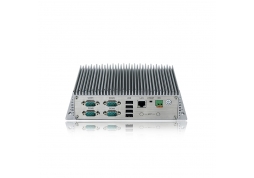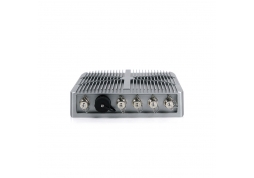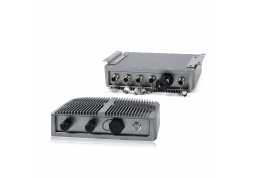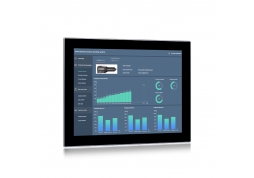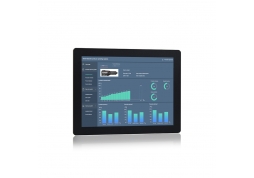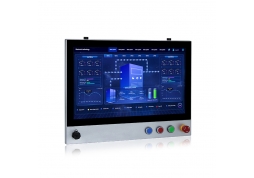Application of Industrial Panel PC in Logistics Sorting Line
Time:2022-07-28 09:43:01
Visit:1778
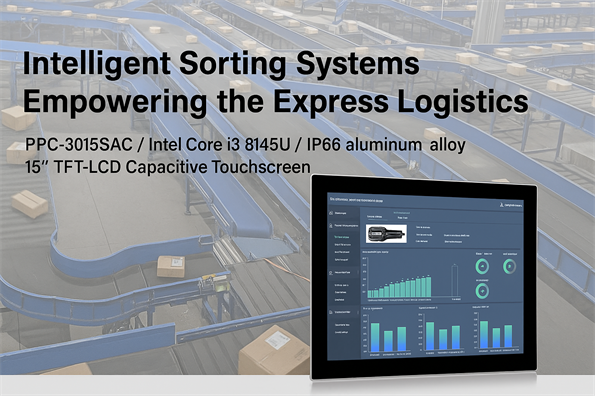
With the rapid growth of the commodity economy and rising demand for small-batch and multi-variety logistics services, the express delivery industry has experienced exponential development. The widespread adoption of electronic waybills and the increasing complexity of order fulfillment have accelerated the need for automation across logistics operations. Among these advancements, intelligent sorting systems have emerged as a cornerstone technology, enabling efficient and accurate parcel distribution.
As logistics companies strive to optimize operations, sorting has become one of the most labor-intensive and critical processes in the supply chain. By integrating machine automation, industrial control, and information technology, sorting robots and circular cross-belt sorters are gradually replacing manual labor. These systems can handle large volumes of packages with high precision, accuracy, and speed, contributing significantly to the operational efficiency and competitiveness of express logistics providers.
The adoption of automated sorting technologies requires robust computing infrastructure capable of supporting complex data processing and reliable system control. Embedded industrial computers provide the foundational hardware support for intelligent sorting systems. These systems must continuously run under diverse and sometimes harsh environmental conditions, maintaining high reliability and low failure rates.
In a typical sorting center, the process includes multiple zones such as scanning and weighing areas, automatic sorting zones, and terminal collection sections. Devices like barcode scanners, industrial cameras, and electronic scales are deployed to capture real-time data, including package identifiers, dimensions, and weight. This data is then processed by edge computing platforms to direct each parcel to its correct path through the conveyor system. Through automation and data integration, human error is reduced and operational efficiency is significantly improved.
To support the automation goals of express logistics providers, InnoAioT offers the PPC-3015SAC industrial panel PC, an all-in-one hardware solution tailored for high-speed and high-volume sorting operations. This fanless panel PC is equipped with the Intel Core i3-8145U processor, delivering reliable computing power with energy efficiency. Its aluminum alloy front panel meets IP66 protection standards, offering superior resistance to dust and water ingress for long-term stable operation in harsh environments.
The 15-inch TFT LCD screen with capacitive touch provides intuitive user interaction and real-time visualization of the sorting system. The system supports a wide range of connectivity options including dual Gigabit Ethernet ports, two RS232 or RS485 serial interfaces, and multiple USB and expansion ports. These interfaces allow seamless integration with barcode scanners, RFID readers, industrial cameras, and alarm systems, enabling comprehensive data acquisition and control across the sorting line.
To further enhance operational reliability, the PPC-3015SAC supports 9 to 36V wide voltage input with built-in overcurrent, overvoltage, and reverse connection protection. Its onboard TPM 2.0 hardware security module ensures data protection and system integrity, meeting the information security demands of modern logistics enterprises.
When deployed in a logistics sorting workstation, the PPC-3015SAC works in coordination with the conveyor belts, alarm systems, and scanning equipment to accelerate package identification and distribution. It shortens response time to system errors, improves sorting accuracy, and reduces manual workload. Combined with wireless network support such as Wi-Fi or 4G/5G connectivity, it allows centralized control and real-time data synchronization between multiple sorting lines and cloud-based platforms.
By building an intelligent, visualized, and controllable sorting environment, logistics companies can optimize resource allocation, ensure timely delivery, and adapt to the growing demand for fast, reliable shipping services.
As logistics companies strive to optimize operations, sorting has become one of the most labor-intensive and critical processes in the supply chain. By integrating machine automation, industrial control, and information technology, sorting robots and circular cross-belt sorters are gradually replacing manual labor. These systems can handle large volumes of packages with high precision, accuracy, and speed, contributing significantly to the operational efficiency and competitiveness of express logistics providers.
The Role of Panel PC in Smart Sorting
The adoption of automated sorting technologies requires robust computing infrastructure capable of supporting complex data processing and reliable system control. Embedded industrial computers provide the foundational hardware support for intelligent sorting systems. These systems must continuously run under diverse and sometimes harsh environmental conditions, maintaining high reliability and low failure rates.
In a typical sorting center, the process includes multiple zones such as scanning and weighing areas, automatic sorting zones, and terminal collection sections. Devices like barcode scanners, industrial cameras, and electronic scales are deployed to capture real-time data, including package identifiers, dimensions, and weight. This data is then processed by edge computing platforms to direct each parcel to its correct path through the conveyor system. Through automation and data integration, human error is reduced and operational efficiency is significantly improved.
Key Requirements for Hardware Systems
-
• Given the high-speed, uninterrupted nature of automated sorting, the embedded computers used must meet several critical requirements
-
• High-performance computing capabilities to process real-time image recognition and sorting algorithms
-
• Industrial-grade durability to withstand long hours of operation and variable environmental conditions
-
• Wide connectivity to integrate multiple peripherals such as cameras, sensors, alarms, and networks
-
• Reliable data communication and remote management for real-time monitoring and control
InnoAioT Solution for Smart Sorting Systems
To support the automation goals of express logistics providers, InnoAioT offers the PPC-3015SAC industrial panel PC, an all-in-one hardware solution tailored for high-speed and high-volume sorting operations. This fanless panel PC is equipped with the Intel Core i3-8145U processor, delivering reliable computing power with energy efficiency. Its aluminum alloy front panel meets IP66 protection standards, offering superior resistance to dust and water ingress for long-term stable operation in harsh environments.
The 15-inch TFT LCD screen with capacitive touch provides intuitive user interaction and real-time visualization of the sorting system. The system supports a wide range of connectivity options including dual Gigabit Ethernet ports, two RS232 or RS485 serial interfaces, and multiple USB and expansion ports. These interfaces allow seamless integration with barcode scanners, RFID readers, industrial cameras, and alarm systems, enabling comprehensive data acquisition and control across the sorting line.
To further enhance operational reliability, the PPC-3015SAC supports 9 to 36V wide voltage input with built-in overcurrent, overvoltage, and reverse connection protection. Its onboard TPM 2.0 hardware security module ensures data protection and system integrity, meeting the information security demands of modern logistics enterprises.
Real-World Benefits
When deployed in a logistics sorting workstation, the PPC-3015SAC works in coordination with the conveyor belts, alarm systems, and scanning equipment to accelerate package identification and distribution. It shortens response time to system errors, improves sorting accuracy, and reduces manual workload. Combined with wireless network support such as Wi-Fi or 4G/5G connectivity, it allows centralized control and real-time data synchronization between multiple sorting lines and cloud-based platforms.
By building an intelligent, visualized, and controllable sorting environment, logistics companies can optimize resource allocation, ensure timely delivery, and adapt to the growing demand for fast, reliable shipping services.
Conclusion

